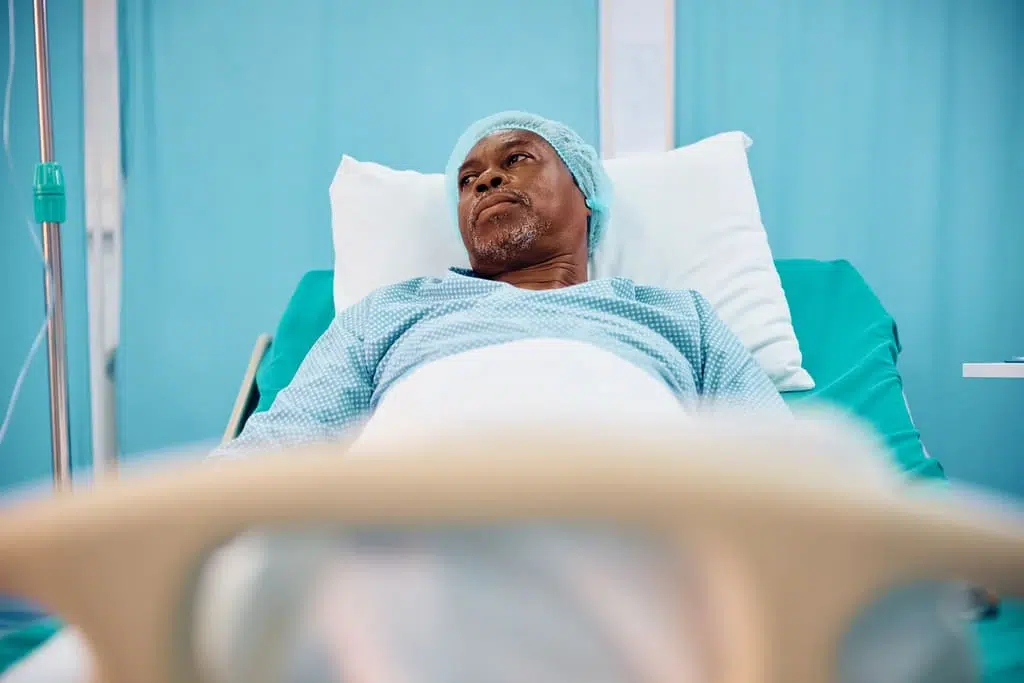What is Post-Surgical Fatigue?
Post-surgical fatigue is a natural body response to the stress experienced by individuals who undergo surgery, whether a minor surgery or a more complex operation. The individual may feel weak or tired following surgery, often accompanied by lethargy and a reduced capacity to engage in regular activities. The roots of post-surgical fatigue can be multiple, with factors such as the effects of general anaesthesia, the body’s natural response to pain, and the use of pain medication all contributing to this post-operative fatigue. Post-operative home care is essential in managing post-surgical fatigue, encompassing a range of supportive measures tailored to the individual’s recovery needs. This may include monitoring vital signs, administering prescribed medications, and providing emotional support to enhance the individual’s overall well-being during the acute post-surgical recovery phase.
One major contributor to post-surgical fatigue is the administration of general anaesthesia, which induces a temporary state of unconsciousness and immobilises the body during the surgical procedure. The residual effects of anaesthesia can linger postoperatively, leaving individuals feeling groggy and drained. Additionally, the body’s response to surgical trauma and the use of pain medication to manage post-operative pain can further cause feelings of tiredness. It is crucial for individuals recovering from surgery to strike a balance between adequate pain management and allowing the body the rest it needs to heal, promoting overall health and a smoother recovery process.
Tiredness After Surgery
Tiredness after surgery is a common and expected feeling that stems from the body’s natural response to the stress and trauma of the surgical procedure. The fatigue that occurs after surgery is usually varied and arises from a combination of factors such as physical exertion during the operation, the effects of anaesthesia, and the body’s complex healing processes. Anaesthesia can linger in the body for some time after the procedure, contributing to a sense of lethargy and drowsiness. Additionally, the body channels a significant amount of energy towards the repair and regeneration of tissues, diverting resources away from usual bodily functions, which can leave individuals feeling unusually tired and weak in the days following surgery.

Moreover, the type and extent of surgery are crucial in determining the degree of fatigue experienced. Major surgical interventions typically result in more evident post-operative tiredness than minor surgeries. The recovery period is essential for allowing the body to recuperate, and people are advised to prioritise rest and sleep to facilitate the healing process. While post-operative fatigue is a normal part of the recovery journey, individuals are encouraged to stay hydrated, maintain a balanced diet, and gradually engage in light physical activity as directed by their healthcare providers to aid in smoother recovery.
What Causes Post-Surgical Fatigue?
Post-surgical fatigue can be attributed to a combination of physiological and psychological factors. One primary cause is the body’s natural response to the stress of surgery. The intricate processes involved in surgery, including anaesthesia administration, tissue manipulation, and healing, trigger a significant release of stress hormones such as cortisol. These hormones cause the body’s fight-or-flight response but can also lead to fatigue and exhaustion as the body works to restore equilibrium. Additionally, the inflammatory response initiated by surgery, a natural part of the healing process, can contribute to fatigue as the body directs energy towards repairing tissues and combating inflammation.
Besides these, post-surgical fatigue can stem from a variety of causes, encompassing both physiological and psychological factors:
- Physiological Stress: The stress induced by surgery triggers the release of stress hormones, which can lead to fatigue as the body responds to the surgical trauma and initiates the healing process.
- Anesthesia Effects: While essential for pain management during surgery, anaesthesia administration can have lingering effects on the central nervous system. This can result in confusion and cognitive fatigue post-surgery.
- Inflammatory Response: Surgery initiates an inflammatory response as part of the natural healing process. The body directs energy toward repairing tissues and combating inflammation, which can contribute to overall fatigue.
- Blood Loss and Fluid Shifts: Surgical procedures may involve blood loss or fluid shifts, affecting blood volume and leading to a temporary drop in blood pressure. These physiological changes can contribute to feelings of weakness and fatigue.
- Pain and Discomfort: Even with effective pain management, post-surgical pain and discomfort can be draining and contribute to fatigue as the body focuses on recovery.
- Emotional Stress: The emotional aspects of surgery, including pre-operative anxiety, fear, and concerns about the outcome, can contribute to mental exhaustion and overall fatigue.
- Sleep Disruption: Hospital environments, discomfort, and changes in routine can disrupt standard sleep patterns, leading to sleep deficit and post-surgical fatigue.
- Nutritional Imbalances: Surgery can impact appetite, and the body's increased energy demands for healing may not be met if there are dietary imbalances or inadequate calorie intake.
Addressing the causes is essential for effectively managing post-surgical fatigue and supporting the individual’s recovery time.
Immediate Post-Surgery Fatigue
The body’s response to surgery involves physiological and psychological factors that can lead to a profound sense of tiredness and lethargy. One primary contributor to this fatigue is the body’s natural healing process, which demands significant energy. The immune system is actively engaged in repairing tissues, combating potential infections, and restoring the body to a state of stability. This heightened metabolic activity, coupled with the stress response triggered by surgery, often leaves individuals feeling drained and fatigued in the immediate aftermath of the procedure.
The emotional and psychological toll of surgery also contributes significantly to immediate post-surgery fatigue. The anticipation of surgery, coupled with anxiety and stress, can disrupt sleep patterns and elevate cortisol levels, leading to a state of heightened fatigue. The psychological strain of undergoing a surgical procedure and the associated recovery process can be physically draining as the body copes with both the physical trauma and the emotional stress. Addressing immediate post-surgery fatigue often involves a combination of proper pain management, adequate rest, and emotional support to help individuals navigate this challenging recovery period.
Duration of Post-Surgical Fatigue
The duration of post-surgical fatigue can vary significantly depending on the type of surgery, individual individual’s factors, and the complexity of the procedure. In general, it is normal for individuals to experience fatigue and reduced energy levels in the days and weeks following surgery. The body undergoes significant stress during the surgical process, and the recovery period involves healing and rebuilding tissues. Simple and minimal procedures may result in shorter durations of post-surgical fatigue, often lasting a few days to a week. On the other hand, more complex surgeries or those involving major organs and systems may lead to more prolonged periods of fatigue, with recovery extending over several weeks or even months.
Several factors can influence the duration of post-surgical fatigue, including the person’s overall health, age, nutritional status, and any pre-existing medical conditions. Adequate rest, proper nutrition, and adherence to post-operative care instructions provided by healthcare professionals contribute to a smoother recovery process and potentially shorten fatigue duration. Individuals need to communicate openly with their healthcare team about their post-surgical experiences, enabling the timely identification and management of any complications that may impact recovery and fatigue levels.
Short-Term Post-Surgery Fatigue
The duration and intensity of short-term post-surgery fatigue can vary based on factors such as the type of surgery, individual health, and the effectiveness of the recovery process. While some individuals may bounce back relatively quickly, others may require a more extended period to regain their energy levels. Adequate rest, proper nutrition, and adherence to post-operative care guidelines reduce short-term post-surgery fatigue. Healthcare professionals typically educate individuals about the expected fatigue, encouraging them to listen to their bodies, gradually resume activity, and allow sufficient time for healing to ensure a smoother recovery process.
Factors Influencing Duration
The duration and intensity of short-term post-surgery fatigue can vary based on factors such as the type of surgery, individual health, and the effectiveness of the recovery process. While some individuals may bounce back relatively quickly, others may require a more extended period to regain their energy levels. Adequate rest, proper nutrition, and adherence to post-operative care guidelines reduce short-term post-surgery fatigue. Healthcare professionals typically educate individuals about the expected fatigue, encouraging them to listen to their bodies, gradually resume activity, and allow sufficient time for healing to ensure a smoother recovery process.
The duration of post-surgery fatigue is influenced by many factors that can vary from individual to individual. Understanding these variables is crucial, as it can inform tailored recovery plans and enhance the overall post-surgical experience.
Factors Influencing Duration of Post-Surgery Fatigue:
Type and Complexity of Surgery – The nature and complexity of the surgical procedure play a pivotal role, with major surgeries often requiring an extended recovery period.
Health Status and Pre-existing Conditions – The overall health and any pre-existing medical conditions significantly impact the body’s ability to heal, affecting the duration of post-surgery fatigue.
Psychological Well-being – Anxiety and stress levels, both pre- and post-surgery, can disrupt sleep patterns and influence cortisol levels, contributing to prolonged fatigue.
Mindset and Expectations – Individual’s expectations regarding the recovery process can shape their experience, with those anticipating a more extended recovery potentially facing prolonged fatigue.
Managing Post-Surgical Fatigue

Managing post-surgical fatigue is a critical aspect of the recovery process, and incorporating physical therapy can be instrumental in easing the transition back to optimal health. After a surgical procedure, patients often experience a significant depletion of energy and stamina due to the body’s natural response to the trauma it underwent. Tailored physical therapy sessions under healthcare professionals typically involve gradually introducing gentle exercises that target specific muscle groups without causing undue strain. Physical therapy facilitates a progressive recovery by focusing on controlled movements and exercises adapted to the individual’s condition, helping people regain strength and reduce fatigue.
In the initial several days following surgery, it is essential to balance rest and activity. While getting enough rest is crucial for the body to heal, incorporating light exercises, as the healthcare team advises, is equally important. Gentle exercises prevent muscle atrophy and improve blood circulation. Individuals are encouraged to stick to a personalised physical therapy plan that considers the type of surgery, overall health, and any specific restrictions.
Home Care as a Solution for Post-Surgical Fatigue
Home care is essential for post-surgical fatigue, providing individuals with a supportive and comfortable environment to recover from medical procedures. After surgery, individuals often experience physical and mental exhaustion, making the familiar setting of their own home an ideal space for healing. Home care services encompass a range of personalised assistance, including skilled nursing, rehabilitation exercises, and emotional support, tailored to meet each person’s unique needs. This personalised approach promotes recovery and minimises the stress and discomfort associated with transitioning from a hospital to a home environment. By receiving care in the familiar surroundings of their homes, people can focus on healing, regain strength, and gradually resume their daily activities.
Furthermore, home care fosters a sense of autonomy and independence for post-surgical patients. Being in the comfort of their own home allows individuals to actively participate in their recovery process, making decisions about their care alongside healthcare professionals. This empowerment can positively impact mental well-being, contributing to a more optimistic outlook on recovery. In addition, home care facilitates a smoother transition back to regular life, as individuals can gradually reintegrate into their routines and surroundings with the ongoing support of caregivers. Overall, home care is a comprehensive and person-centred solution, addressing the physical aspects of post-surgical fatigue and the emotional and psychological part of the recovery process.
Read more about what we recommend to ensure a safe and comfortable post-operative recovery at home by implementing key safety measures.
Post-operative Care with Leaf Complex Care
Leaf Complex Care supports individuals in post-operative care within the comfort of their own homes by employing a team of highly skilled and compassionate support workers, ensuring that individuals receive personalised assistance tailored to their specific needs. Providing services such as wound care and medication management, our support workers offer comprehensive and tailored care plans to enhance the overall well-being of individuals.
The care team collaborates closely with the person’s medical team to create a cohesive care plan that aligns with the doctor’s recommendations. This collaborative approach ensures continuity in post-operative care, reducing the risk of complications and promoting a faster and smoother recovery process.
Contact us today and begin your journey to recovery from the comfort and familiarity of your home with the expert care you deserve.
Offices: Bristol, Slough, Birmingham and Somerset.








